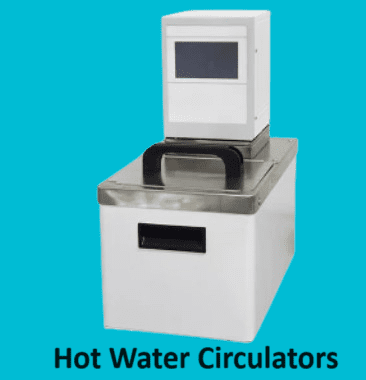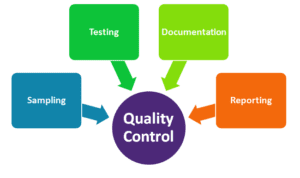In the pharmaceutical industry, precision and accuracy are paramount. Every process, from drug formulation to final packaging, is meticulously controlled to ensure that products meet stringent quality standards. One of the critical components in achieving this level of precision is the use of hot water circulators in quality control laboratories. These devices play a vital role in various laboratory processes, contributing to the reliability and consistency of pharmaceutical products.

What are Hot Water Circulators?
Hot water circulators are devices designed to maintain a consistent temperature within a defined range. They consist of a heating element, a pump, and a reservoir for the water. The heating element raises the water temperature, while the pump ensures continuous circulation, maintaining uniform heat distribution throughout the system. These circulators can be precisely controlled to provide stable temperatures, which is crucial for various laboratory applications.
Applications in Quality Control Laboratories
1. Dissolution Testing
Dissolution testing is a key quality control procedure in the pharmaceutical industry. It measures the rate at which a drug dissolves in a given solvent, simulating how it will dissolve in the human body. Hot water circulators are essential in this process, as they maintain the temperature of the dissolution medium, ensuring consistent and reproducible results. A stable temperature is crucial because even slight variations can significantly impact the dissolution rate, leading to inaccurate data.
2. Stability Testing
Stability testing assesses how a drug product maintains its quality over time under various environmental conditions. Hot water circulators help create controlled temperature environments in stability chambers, ensuring that the samples are exposed to precise conditions. By maintaining a constant temperature, these circulators help predict the shelf life of pharmaceutical products and ensure their efficacy and safety throughout their intended use period.
3. Viscosity Measurements
In the pharmaceutical industry, viscosity measurements are vital for characterizing the flow properties of liquid formulations. Hot water circulators provide a controlled temperature environment for viscosity measurements, ensuring that the temperature-dependent properties of the samples are accurately determined. Consistent temperature control helps obtain reliable and reproducible viscosity data, which is crucial for ensuring product consistency and performance.
4. Enzyme and Protein Studies
Many pharmaceutical products involve biological components such as enzymes and proteins. The activity of these biological molecules is highly dependent on temperature. Hot water circulators provide the precise temperature control necessary for studying enzyme kinetics and protein stability. Accurate temperature regulation ensures that the biological activity is maintained, allowing researchers to draw valid conclusions about the behavior of these molecules under various conditions.
Advantages of Hot Water Circulators
1. Precision and Accuracy
Hot water circulators are designed to provide precise temperature control, which is essential for reproducible laboratory results. The accuracy of these devices ensures that experiments and tests can be conducted under exact conditions, leading to reliable data and consistent product quality.
2. Stability and Uniformity
The continuous circulation of water ensures uniform temperature distribution throughout the system. This stability is critical for experiments that require consistent environmental conditions. Hot water circulators eliminate temperature gradients, providing a stable environment for sensitive laboratory processes.
3. Versatility
Hot water circulators are versatile devices that can be used in a wide range of applications. They are compatible with various laboratory instruments and can be used for different testing procedures, making them an invaluable asset in pharmaceutical quality control laboratories.
4. Enhanced Efficiency
By providing a controlled temperature environment, hot water circulators streamline laboratory processes and enhance efficiency. They reduce the need for manual temperature adjustments and monitoring, allowing laboratory personnel to focus on other critical tasks. This efficiency is especially important in high-throughput pharmaceutical laboratories where time and accuracy are of the essence.
Choosing the Right Hot Water Circulator
1. Temperature Range and Stability
When selecting a hot water circulator, it is essential to consider the temperature range and stability required for specific laboratory applications. Different experiments may require different temperature settings, so a circulator with a broad and precise temperature range is preferable.
2. Capacity and Flow Rate
The capacity of the water reservoir and the flow rate of the pump are also important factors. Larger reservoirs and higher flow rates ensure that the system can handle larger volumes of water and maintain consistent temperature control, even for extended periods.
3. Compatibility
Compatibility with existing laboratory equipment is another crucial consideration. The hot water circulator should be easily integrated with other laboratory instruments and systems to ensure seamless operation and efficient workflow.
4. Reliability and Maintenance
Reliability is paramount in a pharmaceutical quality control laboratory. Hot water circulators should be robust and require minimal maintenance to ensure uninterrupted operation. Choosing a reliable and reputable manufacturer can help ensure that the circulator meets the stringent demands of pharmaceutical applications.
Case Study: Implementation in a Pharmaceutical Plant
Background
A leading pharmaceutical plant implemented hot water circulators in its quality control laboratory to enhance the precision and reliability of its testing processes. The plant focused on improving dissolution testing, stability testing, and viscosity measurements to ensure the highest quality of its drug products.
Implementation
The plant selected hot water circulators with a wide temperature range, high stability, and compatibility with existing laboratory equipment. The circulators were integrated into the laboratory’s dissolution testing apparatus, stability chambers, and viscometers. The implementation process included training laboratory personnel on the operation and maintenance of the new equipment.
Results
The implementation of hot water circulators led to significant improvements in the quality control processes. The dissolution testing results became more consistent, and the stability testing provided more reliable data on the shelf life of the products. Viscosity measurements were more accurate, leading to better characterization of liquid formulations. Overall, the plant observed an increase in the efficiency and reliability of its quality control laboratory.
Conclusion
Hot water circulators are indispensable tools in the quality control laboratories of pharmaceutical plants. Their ability to provide precise and stable temperature control is crucial for various laboratory processes, from dissolution testing to stability studies. By ensuring consistent and accurate results, these devices play a vital role in maintaining the high quality of pharmaceutical products. The advantages of precision, stability, versatility, and efficiency make hot water circulators an essential investment for any pharmaceutical quality control laboratory. Through careful selection and implementation, pharmaceutical plants can significantly enhance the reliability and efficiency of their quality control processes, ensuring the delivery of safe and effective drug products to the market.
Frequently Asked Questions (FAQs):
What is a hot water circulator, and how does it work?
Answer: A hot water circulator is a device used to maintain a consistent temperature in laboratory settings. It consists of a heating element, a water reservoir, and a pump that circulates the heated water throughout the system. The heating element raises the water temperature, while the pump ensures continuous circulation, maintaining uniform heat distribution. This precise temperature control is crucial for various laboratory applications.
Why are hot water circulators important in pharmaceutical quality control laboratories?
Answer: Hot water circulators are essential in pharmaceutical quality control laboratories because they provide precise and stable temperature control, which is critical for obtaining reliable and reproducible results in various tests and experiments. These devices are used in dissolution testing, stability testing, viscosity measurements, and enzyme and protein studies, all of which are vital for ensuring the quality and efficacy of pharmaceutical products.
What role do hot water circulators play in dissolution testing?
Answer: In dissolution testing, hot water circulators maintain the temperature of the dissolution medium at a consistent level. This is important because the rate at which a drug dissolves in a solvent can be significantly affected by temperature variations. By providing a stable temperature environment, hot water circulators ensure that dissolution tests yield accurate and reproducible results, which are crucial for assessing the bioavailability of drugs.
How do hot water circulators contribute to stability testing?
Answer: Stability testing involves assessing how a drug product maintains its quality over time under different environmental conditions. Hot water circulators help create controlled temperature environments in stability chambers, ensuring that the samples are exposed to precise and consistent conditions. This controlled environment is necessary to accurately predict the shelf life and stability of pharmaceutical products.
Why is temperature control important in viscosity measurements?
Answer: The viscosity of liquid formulations is temperature-dependent, meaning that even small temperature fluctuations can affect viscosity readings. Hot water circulators provide a controlled temperature environment for viscosity measurements, ensuring that the samples’ temperature-dependent properties are accurately determined. This helps obtain reliable and reproducible viscosity data, which is essential for ensuring product consistency and performance.
What should be considered when choosing a hot water circulator for a pharmaceutical laboratory?
Answer: When selecting a hot water circulator for a pharmaceutical laboratory, consider the following factors:
- Temperature Range and Stability: Ensure the circulator can maintain the required temperature range with high stability.
- Capacity and Flow Rate: The reservoir size and pump flow rate should match the laboratory’s needs for volume and circulation.
- Compatibility: The circulator should be compatible with existing laboratory equipment and easily integrated into current workflows.
- Reliability and Maintenance: Choose a reliable model that requires minimal maintenance to ensure continuous operation.
How do hot water circulators enhance laboratory efficiency?
Answer: Hot water circulators enhance laboratory efficiency by providing a controlled temperature environment, reducing the need for manual temperature adjustments and monitoring. This allows laboratory personnel to focus on other critical tasks, streamlining workflows, and improving overall productivity. The consistency provided by these devices ensures that experiments and tests are conducted under exact conditions, leading to reliable data and consistent product quality.
Can hot water circulators be used with different laboratory instruments?
Answer: Yes, hot water circulators are versatile devices that can be used with various laboratory instruments. They are compatible with dissolution testers, stability chambers, viscometers, and other equipment requiring precise temperature control. This versatility makes them an invaluable asset in pharmaceutical quality control laboratories.
What are the maintenance requirements for hot water circulators?
Answer: Maintenance requirements for hot water circulators typically include regular cleaning of the water reservoir and pump to prevent buildup of impurities, checking and calibrating the temperature controls, and ensuring that the heating element and pump are functioning correctly. Following the manufacturer’s maintenance guidelines and schedule helps ensure the circulator operates efficiently and reliably over time.
How did the implementation of hot water circulators improve quality control in the case study pharmaceutical plant?
Answer: In the case study, the implementation of hot water circulators improved quality control by providing consistent and reliable temperature control for various tests. This led to more accurate and reproducible dissolution testing results, better stability testing data, and more precise viscosity measurements. As a result, the plant observed enhanced efficiency and reliability in its quality control processes, ensuring the delivery of high-quality pharmaceutical products.



